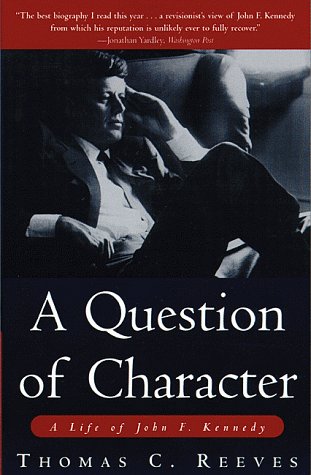That Presidents—chief magistrates of the nation—ought to possess solid character was taken for granted in the early Republic and for a long time thereafter. No longer is this the case. Character comes up for discussion mainly when someone like Gary Hart, caught with his pants down, throws the political odds-makers into a sudden tizzy. Even conservatives have relaxed their standards to accommodate, after the fashion of the new age, Presidents divorced from their first wives.
Twentieth-century Americans probably would acknowledge, if polled, the desirability of high standards in political leaders. On this basis, it isn’t easy to explain the enthusiasm of an older, primmer America—and the continued wistfulness of those who remember him and of those who were unborn when he died—for John Fitzgerald Kennedy, who: conducted endless affairs and one-night (sometimes five-minute) stands his whole adult life, including his years in the White House; fornicated on a Mediterranean-anchored yacht while his wife wrestled with a difficult pregnancy; lied about his precarious health; lied about his war record; talked crudely and profanely as a matter of course; pretended to intellectual attainments and interests that weren’t his at all; loved power more than principle; and so on.
Professor Thomas C. Reeves, of the University of Wisconsin-Parkside, does not address in detail the reasons for our self-deception regarding JFK. Instead he gives us, learnedly and luminously, leads to pursue in the investigation. A Question of Character ascended to the New York Times best-seller list last summer, where it deserved to repose for some time. Thomas Reeves, a biographer of Joe McCarthy, was as taken thirty years ago with Kennedy as were many other people. He and his wife “greeted the election returns with loud celebration. It was a time for greatness in Washington.” What happened to that greatness? Reeves writes, not without pain: “The real Kennedy—as opposed to the celebrated hero espoused by the Kennedy family, the media, and the Camelot School—lacked greatness in large part because he lacked the qualities inherent in good character.” He wasn’t nearly as good, or as smart, or as kind, or as much in control, as he looked from afar.
Reeves scrutinizes the dreary record. The “vigah” that JFK projected was induced in part by steroids and amphetamines. What Kennedy liked best was winning—at any cost. This made him, according to Reeves, “pragmatic to the point of amorality.” Likewise the President “abused his high position for personal self-gratification.” Various members of his staff were no better than procurers; when the President wanted a woman, which was often, a woman he got.
Yet what success he had at fooling some of the people all of the time and all of the people some of the time! (There are advantages to brief presidencies if one doesn’t mind the leave-takings.) One reason for the Kennedy-mania of the 60’s and since was the late President’s charm, which was unmistakable. He had “It.” Reading between Reeves’ lines, one might speculate that JFK’s very lack of earnestness helped him. He never knitted his handsome forehead tightly over matters of principle—not in the early years. (He was earnest only about winning.) Also, he had the press, which liked the President and wanted him to do well. Concerning Kennedy’s omnivorous sexual appetites, and his extramarital affairs, George Reedy admits: “We knew. We all knew.” “We” just didn’t tell. There existed a kind of press-presidential collegiality that would have made all the difference to Richard Nixon, a different sort of man.
A Question of Character is no wanton mugging of the fallen President’s memory. Reeves finds Kennedy maturing in office by the time of the Cuban missile crisis. The President genuinely dreaded nuclear warfare and eschewed recklessness in the face of Nikita Khrushchev’s challenge to the Monroe Doctrine. “There was more to Kennedy’s character by this time than the pursuit of power and pleasure that had shaped his career,” Reeves writes. The presidency seems indeed to shape the man—at least to an extent. And Kennedy’s nearly lifelong battle with physical debility likewise commands respect. He was frequently in agony from back pain and Addison’s disease (a failure of the adrenal glands), but he soldiered on. Less admirable were the lies he told, and in which close associates connived, concerning his condition. The country, without knowing it, had elected a most unhealthy President, who might not have been able to serve out a second term.
Even Kennedyphobes may find poignance in the tale of a little boy visibly upset whenever his mother—as frequently happened—packed her bags for extended, travel; craving love but finding instead, in his formidable father, only the push for success at any cost. As Reeves says, “The principle aim of life for the Kennedy youngsters—as defined by their father—was to achieve public success and prestige.” One thing women seemed to love in JFK was his waif-like quality. He was in some sense a waif all his life—adrift from close relationships, from deeply held principles, from, in Reeves’ words, “a moral center, a reference point that went beyond self-aggrandizement.”
No plaster saint was John F. Kennedy. The wonder maybe is that the nation fared no worse than it did under his stewardship. The Kennedy years, presided over by a waif with the sexual appetite of a goat, demonstrate inadvertently the great tensile strength of the Republic, and of the American people. We manage somehow to survive even our idols.
[A Question of Character: A Life of John F. Kennedy, by Thomas C. Reeves (New York: The Free Press) 528 pp., $24.95]

Leave a Reply